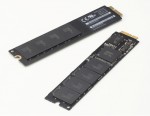This regular series features highlights from the week.
SSD
Toshiba Offers “Blade” SSDs (Like Apple’s MacBook Air)
More information about the unconventional SSD used in Apple’s new MacBook Air. As I discussed in my previous coverage of this new flash form factor, it resembles a PCI Express Mini Card but is much smaller. Toshiba has now proved my speculation that the device uses SATA signals rather than the PCI Express lane used by the similar AirPort card. We also know that the lauded performance of the device is due to its chips and controller rather than skipping SATA in favor of PCIe as some had speculated.
Back From the Pile: Interesting Links, October 22, 2010
This week’s links focused on the MacBook Air, and Iomega’s USB 3.0 SSD. On the enterprise side, we have HP’s new training programs, server virtualization assumptions, the rise of the storage industry, and another great piece by Chris Evans.
Apple’s Unconventional New MacBook Air SSD
Apple updated the ultra-slim don’t-call-it-a-netbook MacBook Air this week. Along with a wimpy out-of-date CPU, the new Air features all-SSD storage of an entirely new and apparently proprietary type. Let’s take a look and see what we can see.
Iomega Bundles Capacity and Performance in New External SSD Drive
Iomega, the anchor company in the Consumer and Small Business Products division of storage giant EMC, last week introduced an External SSD Flash Drive designed for business and “prosumer” users. Boasting USB 3.0, built-in encryption, and a suite of backup and security software, the drive is the vanguard of a new breed of rugged and compact external storage. Although expensive by consumer standards, business and pro users will welcome its combination of features and performance.


